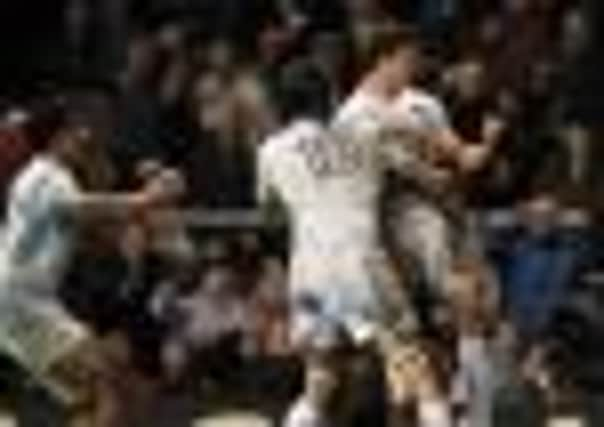England have set standard for bright era ahead


Saturday’s systematic breakdown of an experienced Ireland – who ended their grand slam dream in Dublin last year – added further credence to the promise Stuart Lancaster’s side have shown.
The claims of the former Leeds player and coach to be appointed on a full-time basis will be hard to ignore after a fourth win in this year’s championship.
Advertisement
Hide AdAdvertisement
Hide AdOnly a one-score defeat to eventual grand slam winners Wales was the difference between a clean sweep of their own.
But Lancaster’s appointment and his own philosophy were never about results. They were about building towards the future and the process of achieving that by harnessing a passionate, dedicated and mature group of players.
This has all been accomplished.
What is more, England have shown a versatility in the various nature of their victories; that they are no one-trick pony.
It was rugged defence and defiance that saw them beat Scotland and Italy on the road. Flat out firepower and attacking verve saw them swat aside the mercurial French to seal a third away win in the tournament for the first time in the Six Nations era.
Advertisement
Hide AdAdvertisement
Hide AdAnd Saturday’s triumph was all about the power of their scrum and the use of the top two inches – their common sense.
Much has been made about England’s inexperience – of Lancaster’s also – but these young, hungry players have made a mockery of that with their present-day self-belief.
For the best part of 60 minutes they toiled for an attacking foothold against Declan Kidney’s Ireland, as the ball slipped from white shirt to green and back again on the damp Twickenham surface.
All the while, Graham Rowntree’s well-drilled scrum – led superbly by the front-row trio of Alex Corbisiero, Dan Cole and Dylan Hartley – gained revenge for last year’s grand slam collapse.
Advertisement
Hide AdAdvertisement
Hide AdSuch formidable foundations are what championship teams are built on. Whether or not Lancaster is given the chance he deserves to continue adding the finishing touches, the brickwork is in place in the front row.
How England needed a dominant force as the game meandered past half-time with nothing on the scoreboard but seven traded penalties by Owen Farrell and Jonathan Sexton, the young Englishman having the edge to give England a 12-9 advantage.
The only attacking thrusts under leaden skies were from Keith Earls’s surge that was ended shy of the tryline by Ben Foden and Ben Morgan’s burst that resulted in a dropped ball by Tom Croft.
Croft was then guilty of an even greater act of hot potato juggling when the tryline beckoned early in the second half.
Advertisement
Hide AdAdvertisement
Hide AdIt was as if the party going on along the M4 in Cardiff had taken all the zest out of this challenge.
Then, to England’s great credit, they pricked the bubble of mediocrity to turn a dire contest into a comfortable victory that points to such an exciting future.
It was, of course, the pack that turned the game on its head.
First, Tom Palmer thought he had a try when he pounced on the ball after the England front row had slammed the green machine into reverse.
Advertisement
Hide AdAdvertisement
Hide AdBut referee Nigel Owens had already blown for Irish indiscretions and when the scrum was reset and England induced further panic among the visiting ranks, Owens awarded the penalty try.
Lancaster’s men could have settled for the 10-point win but in a further nod to the promise of tomorrow, they went for the jugular. It was fitting that it was Ben Youngs – a scrum-half maligned for his poor form since the dark days of the World Cup – who got Twickenham to its feet with a quick-tap penalty inside the Irish 22 that caught retreating defenders napping.
The Leicester No 9 did the rest, crossing the whitewash to turn victory into a rout.
Farrell missed the conversion but in the final moments added his sixth penalty, taking his tally to 20 points for the match.
Advertisement
Hide AdAdvertisement
Hide AdFarrell is the man on whose shoulders England’s attacking future rests, but he will be a better player because of the bedrock his forwards provide.
Throughout the tournament, England defended like lions, conceding four tries in five games, two of those coming in a mad five minutes in snow-bound Rome.
“We’ve come such a long way,” reflected England’s triumphant scrum coach Rowntree of a journey that began at a West Yorkshire training camp in late January.
“It’s been an emotional road and the credit lies with that young group of players.
Advertisement
Hide AdAdvertisement
Hide Ad“Half that pack debuted in Scotland and they have driven everything. I’m so proud of them. We are born again and we are not yet the finished article.”
Corbisiero said: “Me, Dan and Dylan learned a harsh lesson last year and we put a lot of things right (against Ireland). Hopefully, that performance the scrum put in is a benchmark for the future.”
England exit the Six Nations with a benchmark, a springboard and all manner of platforms on which to become a title-winning force.
England: Foden (Brown 71), Ashton, Tuilagi, Barritt, Strettle, Farrell, Dickson (Youngs 49); Corbisiero, Hartley (Mears 76), Cole (Stevens 76), Botha (Palmer 55), Parling, Croft, Robshaw, Morgan (Dowson 76). Unused replacement: Hodgson.
Advertisement
Hide AdAdvertisement
Hide AdIreland: Kearney, Bowe, Earls, D’Arcy (O’Gara 49), Trimble (McFadden 74), Sexton, Reddan (O’Leary 49); Healy, Best, Ross (Court 37), O’Callaghan (McCarthy 67), Ryan, Ferris, O’Brien (O’Mahoney 70), Heaslip. Unused replacement: Cronin.
Referee: N Owens (Wales).